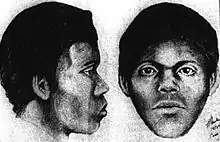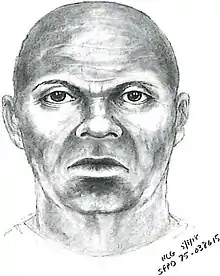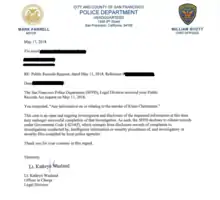The Doodler | |
|---|---|
 1975 police sketch of the suspect. | |
| Born | Unknown |
| Other names | The Black Doodler |
| Details | |
| Victims | 6–16+ dead, 3 survived |
Span of crimes | January 1974 – September 1975 |
| Country | United States |
| State(s) | California |
The Doodler is an unidentified serial killer believed responsible for between six and sixteen murders[1][2] and three assaults of men in San Francisco, California, between January 1974 and September 1975.[3] The nickname was given due to the perpetrator's habit of sketching his victims prior to stabbing them to death.[4] The perpetrator met his victims at gay nightclubs, bars and restaurants.[3][5]
The suspect was described as a Black man between 19 and 25 years of age. He was about six feet tall with a slender build.[6][3] Several victims were stabbed in the front and back of their bodies in similar locations.[7] All of the victims were white males.[6] Police theorized that the victims had all died after meeting with the suspect near the locations where their bodies were recovered.[8]
Murders

- At 1:57 a.m. on January 27, 1974, a corpse was found at the water's edge on San Francisco's Ocean Beach. Gerald Earl Cavanaugh, 49, a Canadian-American immigrant, had been stabbed multiple times.[5] Cavanagh's fully clothed body was located lying face-up.[10] He had died hours before.[11] He was determined to have been conscious at the time he was killed and had attempted to resist his killer because he had self-defense wounds.[8] He initially remained unidentified, being temporarily known as "John Doe #7" by the medical examiner.[12]
- Joseph "Jae" Stevens, 27, was discovered on June 25, 1974, by a woman walking along Spreckels Lake in San Francisco.[13] Stevens had died shortly before his body was found; he had been seen at a club the previous day. He was employed as a "female impersonator" and comedian. Officers suspected that Stevens was alive at the time he had been at Spreckels Lake, possibly transporting himself to the area with the killer.[8]
- Klaus Achim “Claus” Christmann, 31, a German-American immigrant, was discovered by a woman walking her dog on July 7, 1974.[14] He was found similarly to Gerald Cavanaugh, at Ocean Beach in San Francisco.[15] His death had been somewhat more violent than the previous murders because he had considerably more stab wounds than Stevens and had been slashed in the throat several times.[10] The body was fully clothed.[8] Christmann, unlike the previous victims, was married and had children. The fact that he had a "make-up tube" on his person when he died suggested to police he may have been a closeted gay man.[8] He remained unidentified briefly while police were investigating the cases, which they had believed were related after the third murder.[8]
- In January 2022, the San Francisco Police identified another victim. 52-year-old Warren Andrews, a lawyer for the U.S. Postal Service, was found in Land's End on April 27, 1975.[16] Andrews was found unconscious but never regained consciousness dying seven weeks later. Andrews was beaten to death with a rock and a tree branch. Lands End is located around less than two miles away from Ocean Beach, where four of the other victims' bodies were found.
- Frederick Elmer Capin, 32, was discovered on May 12, 1975, in San Francisco.[17] He had been stabbed like the other victims, dying from strikes to his aorta. It is believed his body had been moved approximately twenty feet as disturbances in the nearby sand indicated. Capin was identified through fingerprints when these were matched to those taken "by the state" due to his occupation as a nurse.[18] He also had served in the United States Navy, earning medals while serving in the Vietnam War.[8]
- Harald Gullberg, 66, was a Swedish-American immigrant who was discovered on June 4, 1975 in a decomposed state about two weeks after his death in Lincoln Park.[12] He remains slightly inconsistent with the other homicides because he was far older than the others, his underwear had been taken by his killer and his pants were unzipped. However, Gullberg is believed to have been the final confirmed victim of the Doodler.[5] While he remained unidentified, he was known as "John Doe #81".[8]
Investigation

Police questioned a young man as a murder suspect in the case, but could not proceed with criminal charges because the three surviving victims did not want to "out" themselves by testifying against him in court.[1][3][19] Among the stabbing survivors were a "well-known entertainer" and a diplomat.[20][21] The suspect cooperated with police during his interview but he never admitted guilt for the murders and attacks.[3] Officers stated that they strongly believed that the man in question was responsible for the crimes, but he was never tried or convicted because of the survivors' refusals to appear in court.[12][21] To date, the suspect has not been named publicly or apprehended; very little information is available to the public about the crimes.[3][22][21]
The case is open and ongoing in the San Francisco Police Department.[23] Recent successes using DNA technology developed in the decades since the crimes have led police to re-examine evidence in the case.[24][25] In February 2019, police offered a $100,000 reward for information leading to the arrest of the killer and released a revised sketch showing what he could look like four decades later.[26] They later announced they would consider forensic genetic genealogy, which identified a suspect in the Golden State Killer murders.[6]
Aftermath
At the time, activist Harvey Milk publicly expressed empathy for the victims who refused to speak with police, stating, "I understand their position. I respect the pressure society has put on them." Milk elaborated that the three men likely feared damaging relationships with family and in the workforce, citing that he believed "20% to 25%" of the 85,000 gay men in San Francisco were closeted about their sexualities.[21]
See also
References
- 1 2 Dowd, Katie (April 29, 2018). "10 Bay Area cold cases that remain unsolved". San Francisco Chronicle. Retrieved December 2, 2019.
- ↑ Mojadad, Ida (April 26, 2018). "Meet the Californian Serial Killers Who Haven't Been Caught...Yet - April 26, 2018". SF Weekly. Retrieved June 13, 2018.
- 1 2 3 4 5 6 Newton, Michael (2009). The Encyclopedia of Unsolved Crimes. Infobase. p. 111. ISBN 9781438119144. Retrieved June 1, 2013.
{{cite book}}:|website=ignored (help) - ↑ Mojadad, Ida (June 21, 2018). "'Doodler' Back in Limelight Despite No Updates to Case". SF Weekly. Retrieved June 25, 2018.
- 1 2 3 Robinson, Eugene (November 13, 1975). "One-Killer Theory In 6 S.F. Murders". San Francisco Chronicle. Archived from the original on September 21, 2018. Retrieved September 20, 2018.
- 1 2 3 Miller, Ryan W. (February 6, 2019). "'The Doodler' killed 5 gay men in 1970s San Francisco. Police just released new info on him". USA Today. Retrieved December 2, 2019.
- ↑ "The Sado Murder Horror". The San Francisco Chronicle. January 19, 1976.
- 1 2 3 4 5 6 7 8 Green, Elon (December 11, 2014). "The Untold Story of the Doodler Murders". The Awl. Archived from the original on January 11, 2018. Retrieved January 25, 2016.
- ↑ Barba, Michael (February 16, 2019). "SF police release new sketch of suspected Doodler serial killer". The San Francisco Examiner.
- 1 2 Watt, Nick (June 21, 2018). "After more than 40 years, police say they have a suspect in cold case". CNN. Retrieved June 25, 2018.
- ↑ "2 Stabbing Deaths--One Suspect Arrested".
- 1 2 3 Calhoun, Bob (October 8, 2015). "Yesterday's Crimes: The Serial Killer Who Stalked Gay Men in the Castro". SF Weekly. Foundation. Archived from the original on January 11, 2018. Retrieved January 25, 2016.
- ↑ "Entertainer stabbed to death in GG Park". The San Francisco Examiner. June 25, 1974. Archived from the original on September 21, 2018. Retrieved September 20, 2018.
- ↑ "Police are asking for Help...". The San Francisco Sentinel. July 18, 1974.
Police are asking for help in the identification of this 25-year-old man that was found on Ocean Beach on July 7.
- ↑ Fagan, Kevin (March 23, 2021). "One Man's American Dream Ends in his Bloody Death". San Francisco Chronicle.
- ↑ Dowd, Katie (January 27, 2022.) "Probable sixth victim of Doodler serial killer announced by San Francisco police." SF Gate.(Retrieved January 27, 2022.)
- ↑ "Body of stab victim found at Ocean Beach". The San Francisco Examiner. May 12, 1975. Archived from the original on September 21, 2018. Retrieved September 20, 2018.
- ↑ "Murder Unsolved". The San Francisco Sentinel. May 22, 1975.
- ↑ Time-Life The Most Notorious Serial Killers. Time Inc., Books. 2017. ISBN 978-1683300281.
- ↑ "The Mystery Witness in S.F. Gay Murders". San Francisco Chronicle. July 9, 1977. Archived from the original on September 21, 2018. Retrieved September 20, 2018.
- 1 2 3 4 Staff (July 8, 1977). "Murder suspect free because gays silent". Associated Press. p. 13C. Retrieved June 1, 2013.
- ↑ Vronsky, Peter (2004). Serial Killers: The Method and Madness of Monsters. New York: Penguin. p. 16. ISBN 9780425196403. Retrieved June 1, 2013.
- ↑ "'Doodler killer' cold case has renewed interest". ABC13 Houston. June 25, 2018. Retrieved June 25, 2018.
- ↑ Dowd, Katie (June 21, 2018). "Who was San Francisco's Doodler killer, and why wasn't he caught?". SFGate. Retrieved June 25, 2018.
- ↑ Fagan, Kevin; Sernoffsky, Evan (May 5, 2018). "DNA research in Golden State Killer case spurs hope in unsolved killings". San Francisco Chronicle. Retrieved June 13, 2018.
We're still putting together all the various pieces in the Doodler case to see where it's at.
- ↑ "San Francisco police post reward for serial killer dubbed the..." Reuters. February 7, 2019. Retrieved February 8, 2019.
External links
- The Untold Story of the Doodler Murders, The Awl, published on December 11, 2014.